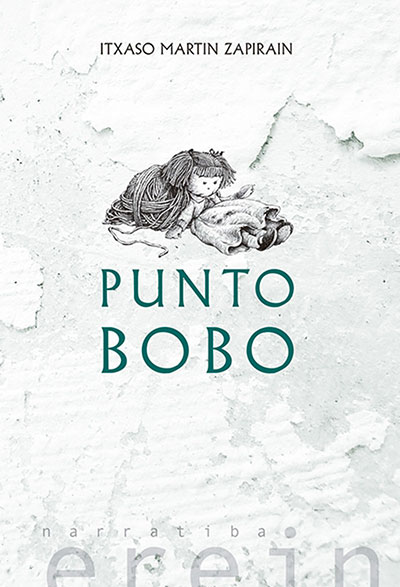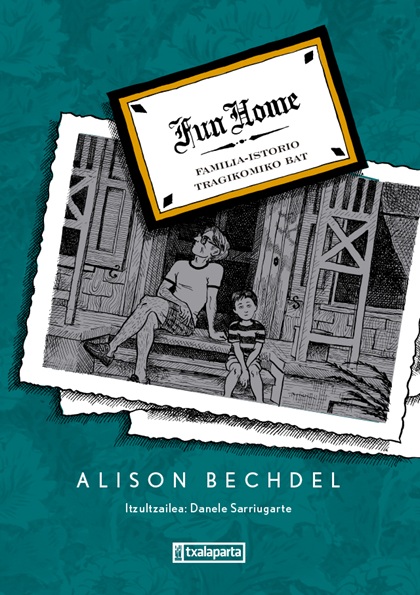"I'll never be like I'll be."
.jpg)
saved" Kattalin Miner | Elkar, 2019
These words from Leoburru can be read in Moio’s farewell letter. Kattalin Miner has done a job on his partner to say goodbye, to claim that it is a political issue, to speak clearly about transphobia and suicide, and to record what happened.
Mourning, farewell. Through interviews, narratives, chronicles, photographs, letters and memories we will be told the life and death of Hernaniarra Moio trans. The voices of Kattalin, Ainara, Ane, Uso, Ander, Ana, Josebe, Maialen, Iratxe, and Brayan will be in charge of shaping the image of Moio's figure.
Make it visible, public. Gender exercises in the book prologue (2013) Learning to see the invisible thanks to the video “realized the size of the wounds caused by body codes”. But besides the pain there was also a political clamour: the call to revolutionize discourses on “norms” of the body and “normal” bodies.
Transphobia. However, in the book by Miquel Missé Transexualities (2013) you can find the definition of transphobia: on the one hand, the pressure we all feel for men and women to act as women, and on the other, the discrimination against people transras (cis, other trans, and their own).
History, genealogy. Collective memory is fundamental for each person to build their identity, because in the case of social minorities it helps to overcome discrimination and violence, to create and consolidate a community, to be a memory and reference. He says that we must awaken consciousness and avoid forgetting.
File, documentation. Ann Cvetkovich proposes in his book An archive of feelings (2003) that, as the responses that have been socially given to homophobia do not satisfy, activism and grief are combined and private events that have been made public on this issue are documented, so that they are not lost, not seen badly and become a reference framework. In fact, emotional experiences can be the basis for new cultures and with the archive of feelings, affective life will become political. That is what Miner has done.
Things have changed a lot lately in terms of transsexuality, but, as they say in the book, there is still a lot to do among those who feel the distant and strange theme (family, colleagues, friends…). This book is a milestone on that road.
Puntobobo
Itxaso Martin Zapirain
Sowing, 2024
----------------------------------------------------
The title and cover image (Puntobobo, Wool Bite and Rag Doll) will suggest mental health, making the point and childhood, but more patches will be rolled up as the book... [+]
Itsasoa bete urre
Dani Martirena
Irudiak: Ana Ibañez
Txalaparta, 2022
--------------------------------------------
Liburu honetara barneratzen den irakurleak sentsazio ugari izango ditu. Deigarria da azaleko letren urre kolorea eta zuritasuna, goialdean ageri den... [+]
Migranteak
Issa watanabe
1545 argitaletxea, 2024
-------------------------------------------
Ezagutzen ez nuen 1545 argitaletxeak 2024an itzuli eta kaleratu du Issa Watanaberen Migranteak liburua. Animalia talde batek egiten duen migrazio prozesua kontatzen du; eta... [+]
Adania
Shibli
Translation: Aitor Blanco Leoz
Igela, 2024
----------------------------------------------
During these days, an Israeli soldier is bombarding hospitals, schools, Palestinian refugee camps with drones as if it were a video game, while in the West we see on... [+]
Fun Home. A tragic family
history Alison Bechdel
Txalaparta, 2024
---------------------------------------------
Fun Home. Alison Bechdel is known for the first publication of the graphic novel A Tragic Family Story (2006), although he himself participated in several... [+]
PLEIBAK
Miren Amuriza Plaza
Susa, 2024
--------------------------------------------------
Susa has published Miren Amuriza's second novel in the atrium of the Durango Fair: Plead. It's plebiscites because you're singing about an earlier recording. Berria includes the... [+]
Book Non sense
Edward Lear
Translation: Juan Kruz Igerabide
Denonartean, 2024
----------------------------------------------
The writer and illustrator Edward Lear published this work in 1846. As Igerabide says in the prologue of the book, “nonsense humor, absurd... [+]
Hetero
Uxue Alberdi
Susa, 2024
----------------------------------------------------
In the era of negationism, the manosphere and trolls, the contribution of literature is essential, because it is an exceptional instrument to look at the folds of reality: the situations... [+]
Guardasola wants rain
Patxi Zubizarreta
Illustrations: Irrimarra
Ibaizabal, 2024
---------------------------------------------
30 years ago Patxi Zubizarreta published the book Marigoringoak hegan; J. M. Illustrated by Lavarello and by the hand of the Catalan publisher... [+]
Eyes on the horizon
Writer: Illustrator Miren Agur
Meabe: Ane Pikaza
Elkar, 2020
-------------------------------------------------------
Miren Agur Meabe has published several texts and books. He's worked with all the literary genres: children's and youth literature,... [+]
Barrengaizto
Beatrice Salvioni (Translation:
deceit Fernando Rey)
Txalaparta, 2024
------------------------------------------------
Fernando Rey has chosen the title of Barrizto to translate La malnata de Beatrice Salvioni. King says he has tried to be the voice of the... [+]
PELLOKERIAK
Ruben Ruiz
Illustrations: Joseba Beramendi, exprai.
Elkar, 2022
-----------------------------------------------
Rubén Ruiz offers a new work of short stories. They are not micronarratives, because the stories, although they can be read independently, have a... [+]
Memet
Noemie Marsily and Isabella
Cieli For Centos, 2022
--------------------------------------------------
We opened the zipper of the camping in red and looked through the leek along with Lucy. With this cover, the reader receives the comic book Memet. Simple words... [+]
A Heart Museum
Leire Vargas
Elkar, 2024
-----------------------------------------------------
The Basque cultural system has a thirst for young people. That's what Leire Vargas said in the written column in Berria. The industry is looking for fresh, varied and diverse... [+]
What you love. Word recall, live reading
Miren Billelabeitia
Pamiela, 2022
------------------------------------------------
Miren Billelabeitia has been a professor at the institute, a literary aficionado and a professor of Universal Literature for years. In 2022 he... [+]

























